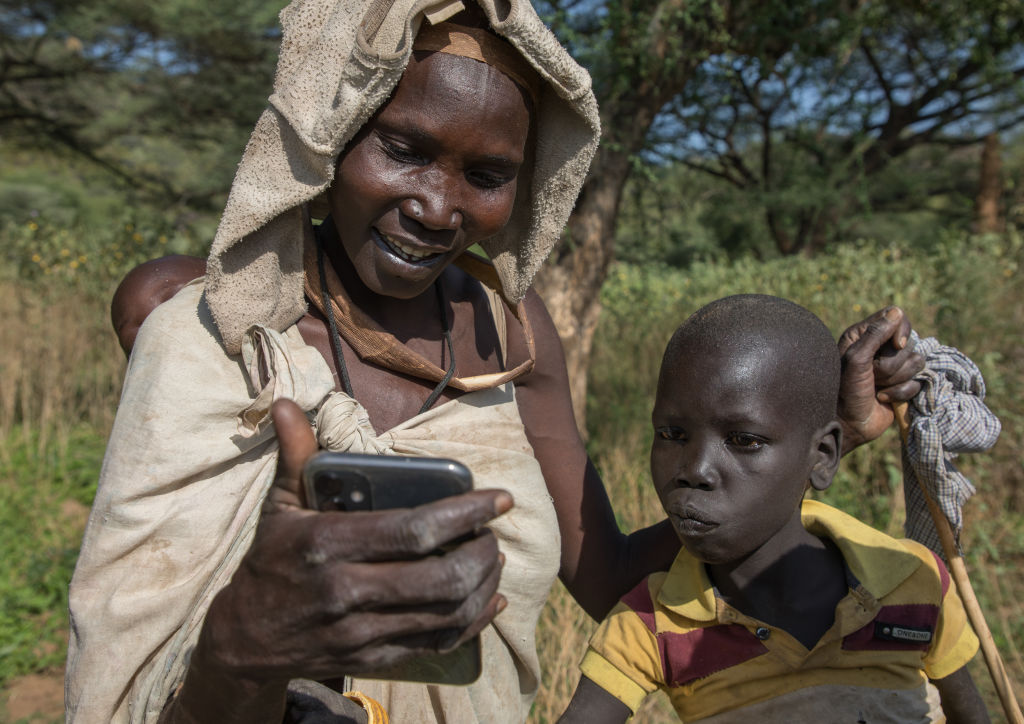
Editor's note: Alexander Ayertey Odonkor is an economic consultant, a chartered financial analyst and a chartered economist with an in-depth understanding of the economic landscape of countries in Asia and Africa. The article reflects the author's opinions and not necessarily the views of CGTN.
In the last decade, the impact of financial technology (fintech) on Africa's financial sector and other key sectors has been phenomenal. As a key driver of growth in the region, fintech is a viable alternative to traditional banking in urban and rural areas. In Africa, fintech creates an enabling environment that opens up the financial sector's value chain and promotes efficiency gains. Across many countries in Africa, fintech is improving financial inclusion and stimulating innovation and productivity in major sectors, such as the small and medium-sized enterprises (SME) sector and the agriculture sector, the backbone of the region's economy.
For instance, in Egypt, North Africa's largest banking sector and banking powerhouse for more than a century, fintech is an indispensable component in scaling up financial inclusion in the country. For banks in Egypt, advancement in fintech reduces operation costs and increases their customer base efficiently. The reliance on fintech augments the capacity of the banks, as they are able to extend digital banking services to the country's large and dispersed population.
With an ultimate goal of providing reliable financial services to a large unbanked population in Egypt since 2011, the financial sector has recorded strives in financial inclusion via fintech in recent times. In 2017, about 33 percent of adults in Egypt had bank accounts, an upswing from less than 20 percent in 2014. While the extension of financial services to rural areas through the traditional banking system is quite challenging, adopting fintech to deliver financial services to a large population of the unbanked and underserved in Egypt is a sustainable panacea in boosting financial inclusion and shared prosperity.
Similarly, in Sub-Saharan Africa (SSA), fintech is a catalyst for growth in financial inclusion and innovation. Although poverty is prevalent in SSA, with a large proportion of low-income households in the region, the remarkable growth in digital financial services has created a newfangled market that allows the people in the region to access reliable, affordable and sustainable financial services. A study conducted by the European Investment Bank (EIB) asserts that about 11 percent of SSA's entire population had mobile bank accounts in 2014, the highest in the world. Digital financial services have been heavily subscribed in rural areas where access to traditional banking is limited.
With poor infrastructure such as low access to the electricity grid, underdeveloped road networks, low access to clean water and predominant low-income households, most traditional banks do not prioritize rural banking penetration, as they consider operating in such deprived locations highly risky. This has led to the reduced availability of financial services in rural areas in SSA. However, an increase in mobile phone penetration, low transaction fees and growth in fintech innovation have boosted the subscription of digital financial services, improving lives in the rural areas where most of the extremely poor are located and agriculture is the main source of livelihood.
According to the International Finance Corporation (IFC), access to digital financial services, such as mobile money, has increased the daily per capita consumption levels of SSA households. Through mobile money services, many poor households have been lifted from extreme poverty, and their standard of living has improved tremendously. Smallholder farmers constitute a large share of farmers in the region. However, a huge financing gap for smallholder farmers and difficulty accessing agriculture insurance have contributed to the decline in income levels of these farmers.
In 2017, the Food and Agriculture Organization of the United Nations (FAO) reported that more than 90 percent of the 48 million smallholder farmers in Africa did not have access to formal credit from financial institutions. Even though the agriculture sector accounts for 32 percent of gross domestic product (GDP) and employs 65 percent of the total population in Africa, less than 6 percent of commercial loans are given to smallholder farmers. However, the advent of fintech in SSA provides a feasible solution to the financial constraints and the challenges associated with accessing insurance in the agricultural sector.
Through innovation in fintech, financial institutions are increasing their agricultural loan portfolio. A fintech startup in Kenya is using data, mobile phones and machine learning to close the data gap that discourages financial institutions from lending to the unbanked and underserved smallholder farmers in the region. With alternative credit risk assessment models that provide financial institutions with adequate agriculture-based, data-driven models to assess smallholder farmers' risk exposure and develop customized loans for farmers, these fintech companies are facilitating lending credit to smallholder farmers in Africa.

A woman shows a mobile phone to her son in Imatong, South Sudan, February 8, 2020. /Getty Images
A woman shows a mobile phone to her son in Imatong, South Sudan, February 8, 2020. /Getty Images
Just as fintech is assisting smallholder farmers in accessing formal credit in the agriculture sector, in the SME sector, fintech is helping small businesses owners to access credit from lending institutions. SME play a pivotal role in the SSA economy, as they account for more than 90 percent of all businesses. However, limited access to finance is impeding growth in the region's SME sector, a drawback that digital financial service providers are seeking to eliminate with innovative financial services.
In Nigeria, Africa's largest economy, where fintech startups have raised over $600 million in funding between 2014 and 2019, more than 200 fintech companies are providing essential services in a country where about 40 percent of the entire population are financially excluded. With an underserved SME sector, some fintech companies in Nigeria leverage payment data to measure lending risk and offer unsecured working capital loans with less documentation via smartphones as the distribution channel.
In as much as fintech is spearheading the reshaping of the financial sector, with several key sectors benefitting from the development, African countries should commit resources to improve three main areas and maximize the potential benefits of fintech: infrastructure development, education and regulatory framework. Governments, development partners and relevant stakeholders in Africa should invest adequately in ameliorating communication infrastructure, clean energy and road networks. Developing Africa's communication infrastructure, providing clean, reliable energy and high-quality road networks, especially in rural areas, will enhance the accessibility of digital financial services.
Policymakers should implement pertinent policies that will ensure the effective regulation of activities in the fintech landscape. As fintech continues to gain popularity in Africa, it is becoming a daunting task to protect users from cyberfraud. An effective regulatory framework will ensure that fintech companies, banks and other telecommunication providers will adopt standard measures to mitigate cyberfraud. These policies should also encourage the integration of markets in the region in a manner that African countries will derive additional opportunities from the African Continental Free Trade Area.
Also, for users of fintech to derive the full benefits from using digital financial services, there should be a deliberate action to propagate information through education. Whereas frequent education programs could be conducted for the uneducated population at the community level to enlighten them on the intricacies of using fintech, across all levels of formal education, fintech could also be taught. The effective implementation of these policies will maximize the benefits of fintech, which will foster shared prosperity and mitigate poverty.
(If you want to contribute and have specific expertise, please contact us at opinions@cgtn.com.)